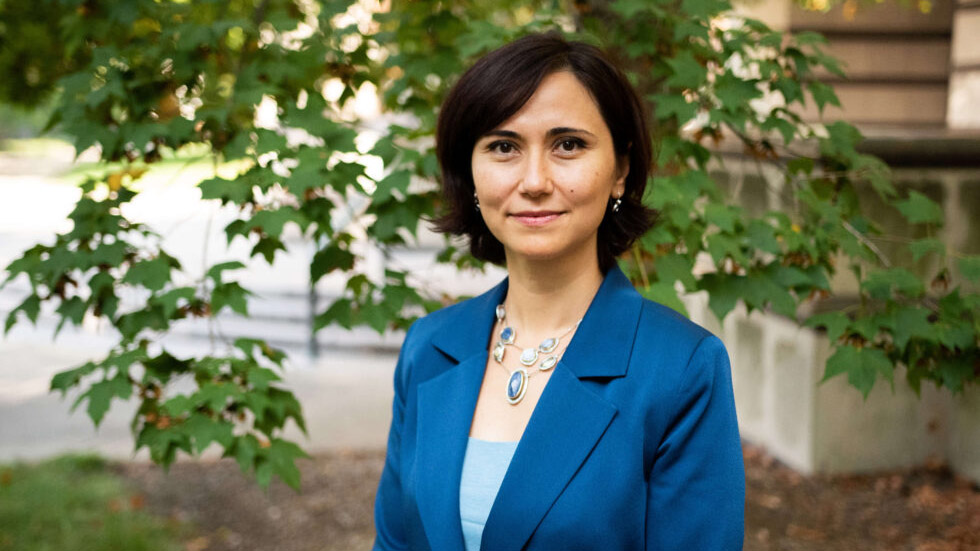Zeynep Madak Erdogan Receives American Association for Cancer Research Award

Zeynep Madak Erdogan is the Cancer Center at Illinois Associate Director for Education and Sylvia D. Stroup Scholar of Nutrition and Cancer, Associate Professor of Food Science & Human Nutrition, and Associate Dean in the Graduate College
Cancer Center at Illinois Associate Director for Education and Sylvia D. Stroup Scholar of Nutrition and Cancer, Zeynep Madak Erdogan (CGD/GSP/EIRH) received the prestigious 2024 Michael B. Kastan Award for Research Excellence given by the American Association for Cancer Research’s Molecular Cancer Research journal. The award recognizes one paper annually with “the potential to shift paradigms, inspire translational activity, and raise awareness of new scientific areas.” Madak Erdogan was honored as the corresponding author for this highly collaborative paper, “Targeting Metabolic Adaptations in the Breast Cancer-Liver Metastatic Niche Using Dietary Approaches to Improve Endocrine Therapy Efficacy,” published in June 2022.
“It was a big surprise to receive this award,” said Madak Erdogan. “The award is an encouragement to pursue more studies like this one. We had to work hard initially to prove that our system was an adequate representation of liver metastasis for breast cancer patients. There was skepticism. Science is always a process, though. At the time of our paper’s publishing, our system was a novel concept and more disputed, but as the paper was shared, cited, and tested, our system is now more mainstream in the lab and the field.”
The system Madak Erdogan refers to includes a hydrogel-based system to characterize how tumor cells behave in the liver microenvironment. Through a diverse collaboration that included CCIL members David Shapiro and Benita Katzenellenbogen (CGD), MD Anderson, and Xylyx Bio, using 3D models, mouse models, and in vivo and in vitro studies, the team developed a novel hydrogel system that allowed them to study the effects of a fasting-mimicking diet upon endocrine therapies in metastatic liver tumors.
“Liver metastatic tumors are known to be difficult to manage for estrogen receptor-positive breast cancer patients. Treatments have not been effective. Our lab wanted to understand this phenomenon better and explore solutions to increase the efficacy of endocrine treatments upon the metastatic tumors,” said Madak Erdogan.
Using a combination of RNA and ChIP sequencing and metabolomics to analyze molecular changes in cancer cells grown in novel hydrogels, her team found that the activity of metabolic pathways relying upon glucose increased. Combining this knowledge with the understanding that FMD reduces glucose metabolism, her team used FMD in models to determine if the liver tumors would present less resistance to the treatment. And that is indeed what happened. The synergistic effect of the diet and the treatment presented promising results.
“When you have a drug that targets a particular pathway, you almost always have a side effect. And invariably, cancer finds a way to overcome the effects of a single chemical. You are dealing with millions of cells, and it only takes one or two mutations for the cancer to keep growing. With FMD, there are a multitude of effects on the body’s overall system, not just on the cancer cells. So, on the liver, a tumor has direct access to every nutrient from the intestine. FMD changes liver physiology itself. We showed that tumors find ways to hijack a critical system that stores energy in the form of glycogen. Instead of liver cells, tumors hoard the glucose and store its energy. With the incorporation of FMD, the tumor was depleted of immediate energy sources. So, FMD can starve the tumor while the therapy is administered, facilitating less treatment resistance,” explained Madak Erdogan.
Qianying Zuo, a postdoctoral researcher at Princeton University, was the first author of the award-winning paper and spearheaded the in vivo and in vitro studies. “Being part of work awarded by the AACR is incredibly gratifying and humbling. It’s a recognition of the collective effort, dedication, and innovation put forth by the team. Knowing that our research impacts the scientific community and potentially influences cancer treatment strategies is immensely fulfilling. It reinforces our commitment to advancing cancer research and underscores the importance of our contributions to the field. Overall, it’s a proud moment and a validation of our hard work and dedication,” said Zuo.
“We are very happy and honored that MCR has selected Prof. Madak Erdogan’s work for its significance and timeliness,” said CCIL Director Rohit Bhargava (CGD). “Characteristic of Zeynep’s work, this study is not only of high scientific quality but can potentially change our thinking and inspire translational activity.”
Madak Erdogan’s team is working on a follow-up paper to expand this research and anticipates future clinical studies.

